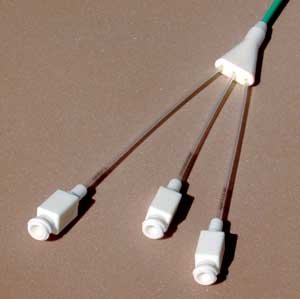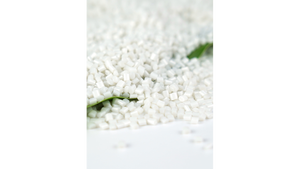Innovation in medical catheters
July 29, 2002
|
Trifurcate molding technology reduces leakage in catheter assemblies and eliminates the need for heat shrinking or bonding adhesives. |
Life as a medical molder in today's competitive market means being creative and innovative. Pelham Plastics Inc. (Pelham, NH) is only five years old but has rapidly achieved a name for itself as an innovative medical molder. Pelham's R&D department has recently developed a method for catheter insert molding that reduces leakage in multilumen configurations.
The company uses Arburg's U-model injection molding machines that allow it to mold horizontally, vertically, and on the parting line, along with a proprietary molding process to insert mold trifurcate connections at the union of multilumen catheters and the adjoining port tubes. Three of the company's four molding presses (ranging from 40 to 110 tons) are the U-model type, says Stephen Lee, operations manager for Pelham.
The trifurcate molding technology has proved to reduce leakage of catheter assemblies, thus minimizing component rejections and assembly field failures. Additionally, it eliminates the need for heat shrinking or adhesives for bonding, which are often inconsistently applied and lead to leakage, resulting in high product failure rates. Other problems include curing and poor aesthetics associated with the adhesive.
To allow for deployment of multiple devices in a single-catheter design, each lumen has a port, or single tube, through which a specific device is introduced to the catheter. The union of these ports with the catheter can present aesthetic and functional challenges to both design and manufacturing engineers.
Pelham molds the trifurcate simultaneously, securing the three tubes to the catheter and providing a consistent seal upon molding. Using the ports as inserts while molding a trifurcate at the union is an ideal approach to both reducing leakage and creating an aesthetically pleasing design.
Lee explains that the specialty molds used to produce the multilumen catheter have custom core pins to allow for the proprietary molding process. "All in all, it's a pretty complex component," says Lee.
Pelham's 10 employees all have backgrounds in the medical device industry, and this level of expertise has put the young company on the map with innovative solutions. "We do quite a bit of R&D," Lee says. "We can take an idea drawn on a napkin and come up with a design solution, which is why we get a lot of work from referrals."
Pelham recently moved into a new 10,000-sq-ft, custom-built facility with a white-room environment for molding and assembly, and specializes in insert molding and overmolding for the medical industry. The company became ISO 9000:2000 certified last year.
Contact information |
You May Also Like



